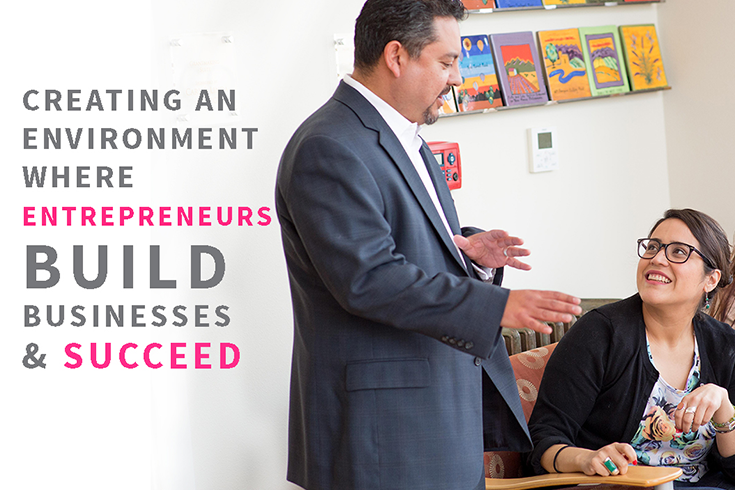Why Big Organizations Support Small
Square, CNM, Nusenda are part of a new wave of entrepreneurial support
To be successful, a startup needs to be profitable, marketable and scalable. It also needs to be attractive to qualified employees, pay competitively, have solid financial backing and access to liquid capital. Easy, right?
The high cost and high risk of startup entrepreneurship is enough to discourage even the strongest of wills. However, there’s a new trend in the startup ecosystem: big organizations offering resources to small companies. From healthcare to bank loans, this new movement could be enough to break entrepreneurial barriers in a big way.
In the last few years, this trend has opened up major opportunities for startups in Albuquerque. State institutions with multi-million dollar budgets are opening up new spaces and new programs to support entrepreneurs. Take CNM Ingenuity's subscription-based makerspace, FUSE, as an example. They give community members access to expensive equipment for a fraction of the cost. Point of sale juggernaut Square just announced “Square Payroll,” a suite of services offering affordable health insurance and retirement savings programs for small businesses. And local financial giant Nusenda Credit Union kicked off Co-op Capital, a community-centered, culturally-relevant microloan program for entrepreneurs who don’t meet the traditional criteria for loans.
More Tools
What’s the incentive for large organizations to support small? Dena Thomas Aouassou, Operations Manager at FUSE Makerspace, says, “CNM Ingenuity is a part of the community. The goal is to provide innovative programming to build economic development. By providing opportunities for small business, the entrepreneurial community is stronger and healthier as a whole.”
FUSE Makerspace is a 13,400-square-foot warehouse of digital and analog industrial fabrication tools open to the community for a monthly membership. CNM Ingenuity is a nonprofit that partners with Central New Mexico Community College and other organizations to increase innovation, training and economic development citywide. At any given moment you’ll find guitar makers, AFRL scientists or jewelry artisans on the FUSE workfloor. Aouassou says this allows a spontaneous and fluid exchange of expertise.
“The collisions and conversations that happen in this space are so valuable. Someone in jewelry is having a conversation with someone in bio tech about the best temperature for annealing metal. They have completely separate applications, but can come together around the kiln and share advice.”
More Benefits
Another area where a large institution is subsidizing overhead costs for small companies is an unlikely one: healthcare and retirement benefits.
Sarah Jacobson, Product Manager at Square, says, “Benefits plans are clearly in high demand, but the process is often confusing for small business owners. Many of our sellers need help navigating the world of benefits—it’s filled with jargon, paperwork and regulatory requirements. By partnering with leading providers who facilitate enrolling and administering benefits, we help remove that complexity for business owners.”
Square, who was recently in town hosting the Growth in Business in ABQ series, announced Square Payroll offerings last November. The suite includes health insurance, 401(k)s, workers’ compensation, HSAs and FSAs.
Jacobson cites recent data from the Employee Benefit Research Institute that found 83 percent of employees said health insurance was very important or extremely important when deciding to choose or stay at a job. Making “big company benefits” available to small business has important implications—it could increase the quality and retention of talented employees, as well as stabilize startups in their precarious first years.
“We believe we can democratize access to quality, affordable benefits,” Jacobson says. “By offering [healthcare and retirement] to employees, employers can attract and retain world-class talent without increasing administrative time.”
More Money
Alongside higher education and private corporations, banks are getting on board too. Locally, Nusenda’s Co-op Capital program is radically increasing access to small business loans—especially for minority-owned companies that are often locked out of the system.
Studies show entrepreneurs of color face higher denial rates, pay higher interest rates and receive lower loan amounts than businesses with identical traits owned by white entrepreneurs. Co-op Capital does not require that borrowers have the usual “5 Cs of Credit” (character, capacity, capital, collateral, conditions)—meaning entrepreneurs who may be unbanked, have little savings or lack credit history now have access to startup funds. So far the program has has loaned over $675,000 in low-cost capital to more than 370 borrowers—put to use buying delivery vans, funding renovations and opening storefronts.
“By reducing eligibility barriers and offering flexible, favorable terms, we’ll see more entrepreneurs enter the market,” says Robin Brulé, Vice President of Community Relations at Nusenda. “The stronger and more diverse our entrepreneurial environment, the stronger our entire economic ecosystem becomes. That’s the benefit of big organizations supporting small. It lifts everyone up.”
Connect the Dots
City Alive is all about big organizations supporting homegrown businesses. We are a group of committed leaders dedicated to collaborating to close the gap in business ownership and leadership with a focus on people of color. Here's some of our favorite stories from our partners of late: How the City of Albuquerque is catalyzing change, how UNM is partnering with the Air Force Research Lab and the Albuquerque Community Foundation's recent Entrepreneurial Expo.


